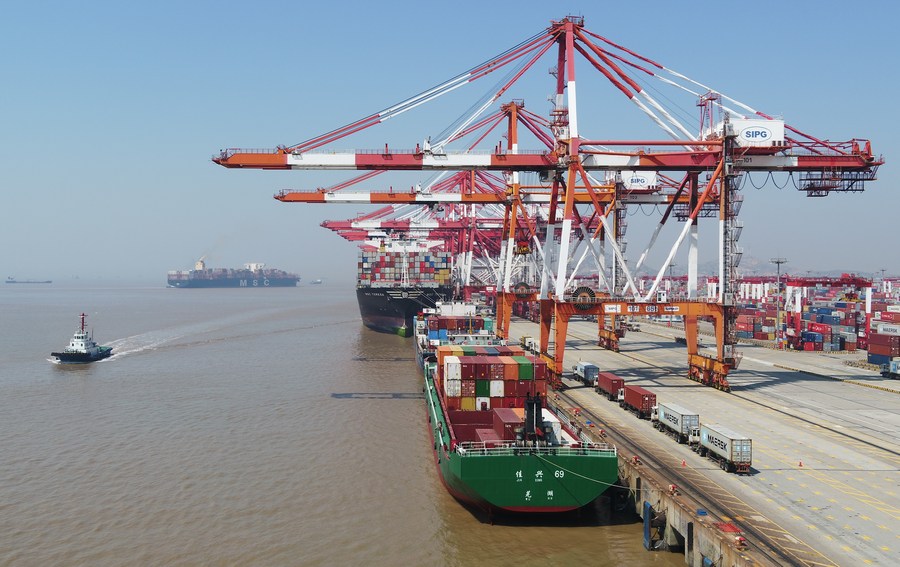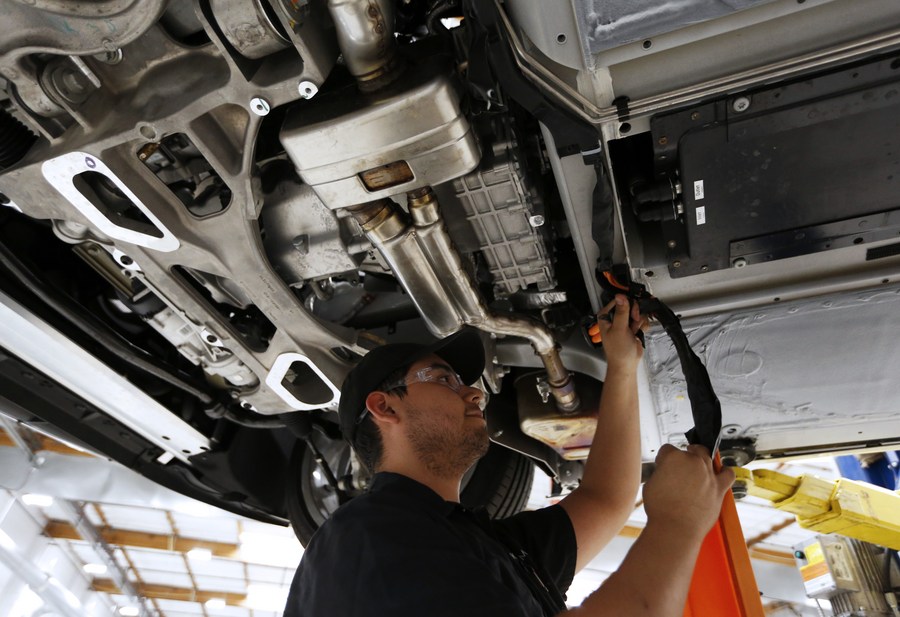
Aerial photo taken on March 18, 2020 shows the container dock of Yangshan Port in Shanghai, east China. (Xinhua/Ding Ting)
What's behind the whine that "America suffered losses" is a sheer ignorance of the "interests surplus" Uncle Sam has obtained from China, and of each other's different industrial structures and resources.
by Xinhua writer Ma Qian
BEIJING, Feb. 5 (Xinhua) -- From a self-serving trade war to brazen sanctions against Chinese firms, Washington's willful bullying and containment of China has plunged the bilateral ties into a serious plight over the past four years.
However, the constructive economic interactions between the two sides have maintained much vitality and resilience, offering hope for a return of the China-U.S. relations to the right track.
Over the past four decades, China-U.S. trade and economic cooperation has served as a stabilizer for the bilateral ties.
Before the U.S. trade war against China, the two countries, with a decade of joint work under the mechanism of Strategic and Economic Dialogue, had maintained effective communication, properly managed differences and promoted mutual trust on trade and economic issues.
Such an economic bond has benefited both sides. The two countries have been major trading partners and key investment sources for each other for years.
Back in 2017, the China-U.S. trade relationship supported roughly 2.6 million jobs in the United States across a range of industries, including jobs that Chinese companies created on the U.S. soil, according to the U.S.-China Business Council (USCBC).

An engineer works at test vehicle area in Chinese-funded electric car producer Karma's headquarters in Irvine, California, the United States, June 25, 2019. (Xinhua/Li Ying)
However, the situation turned sour during the term of former President Donald Trump's administration, as it wielded the banner of protectionism under the self-centered slogan of "America First," accused China of ripping off the United States and launched a trade war against China.
What's behind the whine that "America suffered losses" is a sheer ignorance of the "interests surplus" Uncle Sam has obtained from China, and of each other's different industrial structures and resources.
In contrast to "making America great again," the unilateral act of starting a trade war against China and stoking decoupling with China has made U.S. companies and ordinary citizens pay a high price, and also spoiled the potential of U.S. economic growth.
The trade war has caused a peak loss of 245,000 U.S. jobs, and a significant decoupling of two countries could cut down U.S. Gross Domestic Product by 1.6 trillion U.S. dollars over the next five years, according to a recent study released by the USCBC.
It is conspicuous that the world's two largest economies are closely interdependent with complementarities in many areas. Although those China hawks in Washington could roll out bellicose policies to bash the Asian country, they could, in no way, cut off the bilateral trade and economic cooperation.
Such interaction between the two sides has sustained its constructive role and thwarted, to some extent, the political will to decouple the two countries.
Despite COVID-19 impacts, the China-U.S. two-way trade in goods grew by more than 8 percent to over 580 billion dollars in 2020.
In the business field, U.S. enterprises have generally remained bullish on the Chinese market, many of which increased investment in China and cooperation with their Chinese counterparts, such as Tesla, Walmart and Exxon Mobil.

Photo taken on Jan. 7, 2020 shows China-produced sedans at Tesla's gigafactory in Shanghai, east China. (Xinhua/Ding Ting)
The Wall Street Journal reported last year that China became "a vital refuge" for U.S. companies as the country's "rebounding consumer economy helped offset the damage from tumbling sales back home."
A similar close bond exists in the financial sector as well. As a growing number of Chinese companies went public in the U.S. capital market, more Wall Street giants decided to build up their presence in China.
BlackRock, the world's biggest asset manager, received greenlight for a partnership with a Chinese state-owned bank. Fitch Ratings was approved to enter China's credit rating market, thanks to the country's further opening up of its financial market.
As the world's two largest economies, the United States and China are obligated to promote bilateral ties, which is in the interest of not only themselves, but also the rest of the world.
To date, the China-U.S. relations have come to a new crossroads. By sticking to constructive economic interactions between the two sides, any efforts to bring the China-U.S. relations back to the normal and healthy track can be reasonably expected in the foreseeable future. ■




